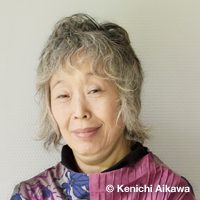Title of Presentation
“Photographing the Presence of Things Left Behind”
Photography was invented to record the scenes in front of us and the people and things that exist now. Everything that appears on photographic paper exists not only for the photographer, but also for many other people who are not present at the time. Photography is a special mechanism that enables us to see worlds that we have never encountered, seen, or visited. Photographed images of objects seem to transcend the information contained in objects themselves, and become entities of light beamed out into an endless realm of images.
While retaining this essential illusion, photography has changed with the times dramatically, and today few people believe that what appears in photographs is reality. Photography crops the world with rectangular frames, manipulates, fabricates, and induces the viewer to see things in a certain way. It has become the ideal artistic medium for inventing something new out of what appears to be familiar reality, and with an understanding of its specific characteristics, anything is possible in this medium.
Since 2000 I have been photographing things that people left behind. These things are the undergarments, clothing, and accessories that dead people wore, belongings that were left behind after people died. The most symbolic belongings are those in the series ひろしま/hiroshima.
There is a blouse worn by a girl who went missing on August 6, 1945. The photographs of the blouse are not an attempt to record or document “reality.” Rather, the blouse is simply a presence in front of me, a garment that encapsulates the 70 years that have passed. I prepared and arranged it beautifully so it would be ready if the girl should come back, and I sought to recreate the feeling of excitement when she wore the newly made blouse for the first time.
Few people are aware that left-behind items are still being newly donated to the Hiroshima Peace Memorial Museum every year. How much has changed since that day in 1945?
This year, too, I will show this ひろしま/hiroshima series all over the world.
Profile
- A brief Biography
-
Born in Kiryu, Gunma Prefecture. With her early photo trilogy, Ishiuchi captured the smell, mood, and atmosphere of a city, and following a later series of photographs titled 1・9・4・7, in which she depicted the hands and feet of women who were also born in the year of her birth, explored in a series of photographs, scars on the human body. She had a solo exhibition titled Time Textured in Monochrome at The National Museum of Modern Art, Tokyo in 1999. In 2005, she represented Japan at the Venice Biennale with Mother’s 2000-2005: Traces of the Future, which photographed her mother’s belongings. In 2008, Ishiuchi released the series ひろしま/hiroshima in which she took pictures of belongings left behind by victims of the atomic bomb, which were shown in her solo exhibition titled ひろしま/hiroshima: Strings of Time at Hiroshima City Museum of Contemporary Art, as well as published as a book. She photographed kimonos of the type known as Meisen, and in 2012 this series, Silken Dreams, was featured in her solo exhibition held at the Marugame Genichiro-Inokuma Museum of Contemporary Art. Ishiuchi was invited to Mexico to photograph Frida Kahlo’s belongings kept at the Frida Kahlo Museum. In 2013 her Yokosuka Story was shown at the Tate Modern in a collection exhibition. In 2014 Ishiuchi had a solo show titled Frida by Ishiuchi Miyako at Michael Hoppen Gallery, and in 2015 she held a solo exhibition titled Postwar Shadows at the J. Paul Getty Museum, at which works ranging from her first series Yokosuka Story to her latest one ひろしま/hiroshima were shown. In 2016, her solo exhibition Childhood Garments is held at the Iwami Art Museum, and she holds a solo exhibition titled Frida is at Shiseido Gallery in Ginza.
- Details of selected Awards and Honors
-
1979 Awarded the 4th Kimura Ihei Memorial Photography Award 1999 Awarded the 11th Shashin-no-kai Award
Awarded the 15th the Domestic Photographer Award of the Higashikawa Award2003 Awarded the 15th Shashin-no-kai Award 2006 Awarded the Photographic Society of Japan Lifetime Achievement Award 2009 Awarded the 50th Mainichi Art Award 2011 Awarded the 60th Kanagawa Culture Award 2013 Awarded the Medal with Purple Ribbon 2014 Awarded the Hasselblad Award 2014 - A list of selected Publications
-
2006 “mother’s 2000-2005 traces of the Future, ” Tankosha 2007 “Innocence,” Akaakasha 2008 “ひろしま/hiroshima,” Shueisha 2010 “Sweet Home Yokosuka 1976-1980” PPP Editions, NY 2013 “Frida by Ishiuchi,” RM, Mexico city 2014 “From ひろしま/hiroshima,” Kyuryudo
“Here and Now: Atomic Bomb Artifacts, ひろしま/Hiroshima 1945/2007-, ” PPP Editions
“Ishiuchi, Miyako Hasselblad Award 2014” Kerhrer, Heidelberg2015 “Ishiuchi Miyako-Postwar Shadows,” The J. Paul Getty Museum, L.A. 2016 “Childhood Garments,” Sokyusha.
“Frida-Love and Pain,” Iwanami Shoten
“Shashin Kankei(Photographic Relationship), “Essay and Photography, Chikuma Shobo






